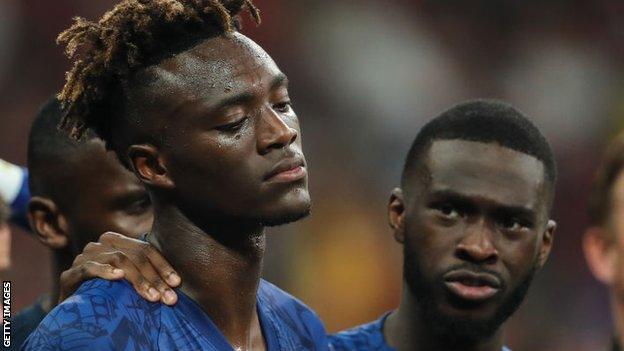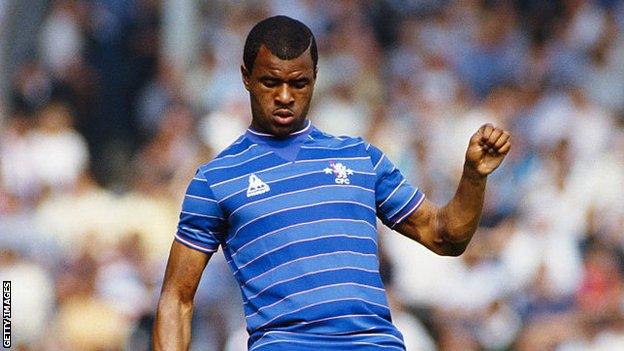Black youngsters should not 'fear' abuse at Chelsea, says Paul Canoville
- Published

Tammy Abraham and Fikayo Tomori (right) have both progressed through the Chelsea academy to the first team
Young black players joining the Chelsea academy should have "no fear" of being racially abused, says the Blues' first senior black player Paul Canoville.
Academy graduate Tammy Abraham was racially abused after a penalty miss in the Super Cup loss to Liverpool.
It follows a review by Barnardo's into claims of racism at Chelsea in the 1980s and 1990s, when young black players faced "daily racial abuse".
But Canoville says prospective new parents and kids "will not be put off".
"Chelsea have one of the best academies in the country with lots of black players coming through," the 57-year-old former winger told BBC Sport.
"With Frank Lampard as head coach of the senior team and Eddie Newton on his backroom staff, black youngsters will be given a chance and a pathway to the first team."
'They were not genuine supporters'
In their report, the charity Barnardo's concluded that the club's ex-youth coach Gwyn Williams was the "instigator of such abuse", after three former academy players made allegations against Williams and fellow coach Graham Rix.
Both men have denied the allegations, but it was during that time that Canoville - who made his first-team debut in 1981 - was being subjected to racial abuse from the club's own supporters from the stands.
"At the time, I was being abused by right wing National Front supporters who were in the ground to try and recruit members and they were not genuine football fans. It was political," said Canoville.
"I didn't get the help at Chelsea at the time because there was a naivety then, but I was supported by my manager and my team-mates.
"I kept quiet because I was scared of getting sanctioned by the governing bodies and the Football League. As a young boy, I dreamt of playing football and I didn't want to ruin my dream."

Paul Canoville played for Chelsea for five years from 1981
However, the former midfielder - who has set up the Paul Canoville Foundation to help young people facing economic, physical or mental adversity - says a "lot has changed" and there are groups at the club who now "want to make change".
"With every incident that is linked to Chelsea, the club step up their efforts in trying to root out the problem," he added.
"The fans' group Chelsea Together send out leaflets and write in the matchday programmes, the fans who used to be scared of reporting incidents aren't anymore and stewards are stepping up.
"London is one of the most multicultural cities in the world but when I was playing, you could not walk down the Fulham Road wearing a Chelsea shirt if you were black. Now, there are all colours and creeds of Chelsea fans in and around Stamford Bridge on matchday."
'A problem in society'
Lampard has condemned the abuse of striker Abraham, 21, saying he is "disgusted by a so-called Chelsea fan".
Frank Lampard disgusted by 'so-called Chelsea fan' racial abuse
Lampard has urged social media companies to do more to prevent players from being targeted online, but Canoville believes racism is a "problem in society".
"When my mum first came over to the UK you had real racial abuse in your face and the N-word was so common, but the law changed, it became an offence and people could no longer do it in the streets," he said.
"So they have taken it to the terraces and social media."
Cannoville believes the abuse is not unique to Chelsea, a notion supported by anti-racism charity Kick It Out, which showed reports of racist abuse increased by 43% last season, with 274 cases compared with 192 the previous season.
However, Chelsea suspended six fans for using "abusive language and threatening and aggressive behaviour" towards Manchester City and England player Raheem Sterling during a Premier League match at Stamford Bridge in December 2018.
One of those fans was banned for life for using "racially abusive language" towards Sterling.
There were also two further cases of racial abuse involving Chelsea last season, which the club are investigating.